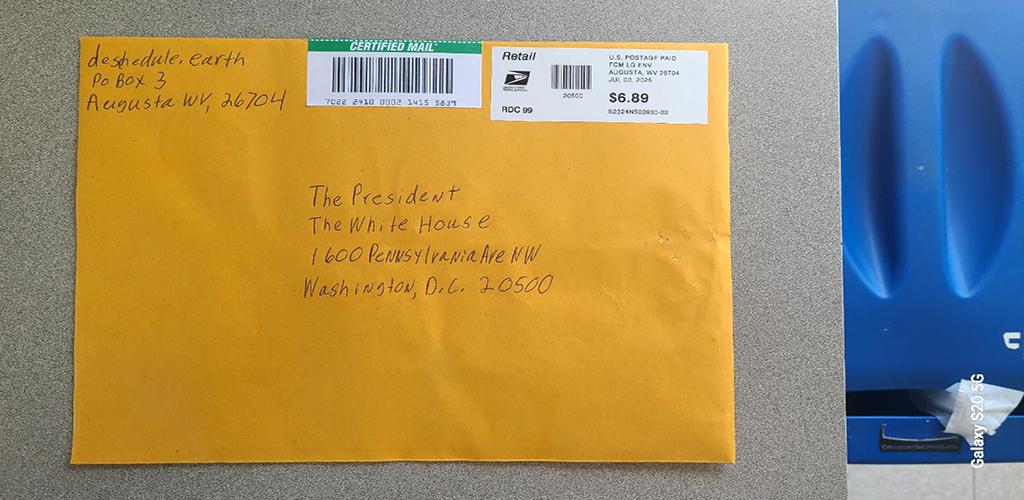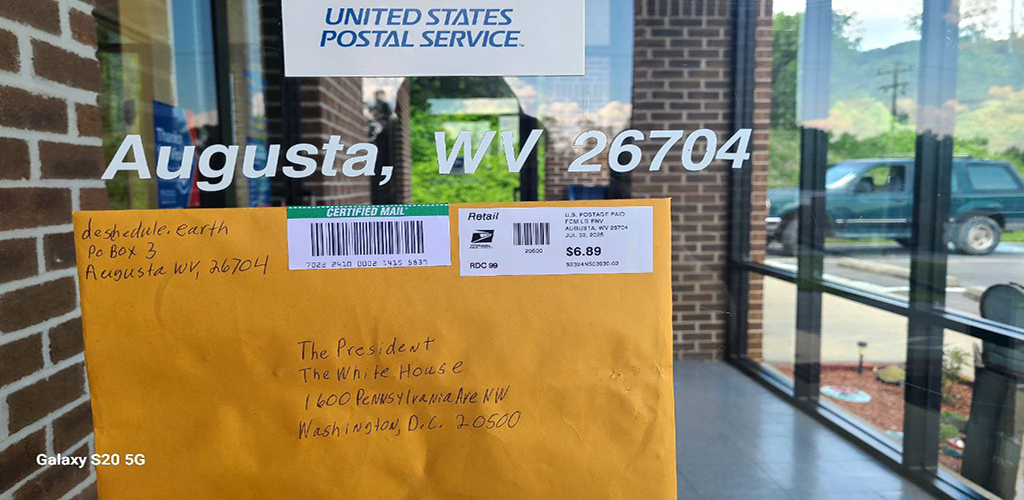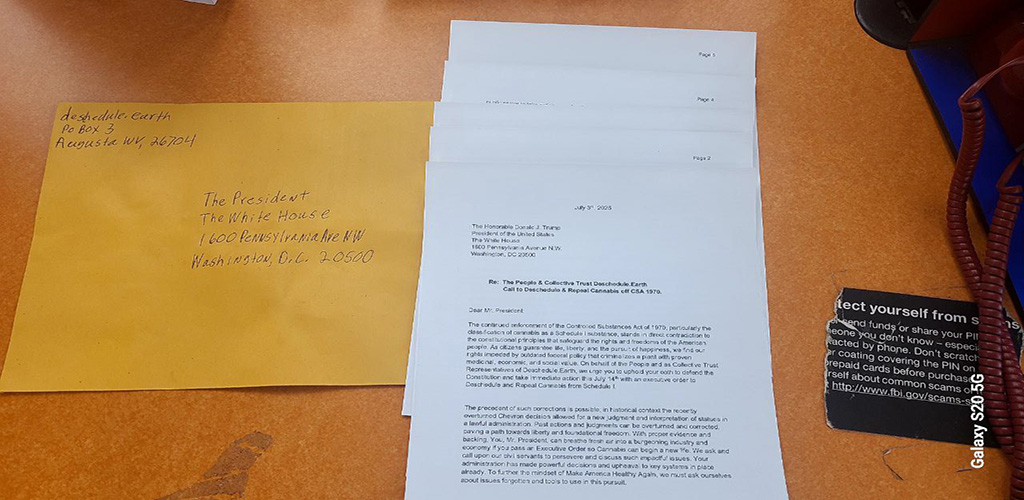The Honorable Donald J. Trump
President of the United States
The White House
1600 Pennsylvania Avenue N.W.
Washington, DC 20500
Re: The People & Collective Trust Deschedule.Earth
Call to Deschedule & Repeal Cannabis off CSA 1970.
Dear Mr. President:
The continued enforcement of the Controlled Substances Act of 1970, particularly the classification of cannabis as a Schedule I substance, stands in direct contradiction to the constitutional principles that safeguard the rights and freedoms of the American people. As citizens guarantee life, liberty, and the pursuit of happiness, we find our rights impeded by outdated federal policy that criminalizes a plant with proven medicinal, economic, and social value. On behalf of the People and as Collective Trust Representatives of Deschedule.Earth, we urge you to uphold your oath to defend the Constitution and take immediate action this July 14th with an executive order to Deschedule and Repeal Cannabis from Schedule I.
The precedent of such corrections is possible; in historical context the recently overturned Chevron decision allowed for a new judgment and interpretation of statues in a lawful administration. Past actions and judgments can be overturned and corrected, paving a path towards liberty and foundational freedom. With proper evidence and backing, You, Mr. President, can breathe fresh air into a burgeoning industry and economy if you pass an Executive Order so Cannabis can begin a new life. We ask and call upon our civil servants to persevere and discuss such impactful issues. Your administration has made powerful decisions and upheaval to key systems in place already. To further the mindset of Make America Healthy Again, we must ask ourselves about issues forgotten and tools to use in this pursuit.

Recognizing Cannabis as a Legitimate Agricultural Commodity
The USDA must acknowledge regulation and foothold in such efforts with cultivation, federal influence and moreover the implications of housing, health and medicinal aid. The First Food Initiative has made great strides to demonstrate the nutritional impact of raw hemp and the associated benefits. With key research being accessible highlighting amino acids, vitamin and mineral content and immunity support functions of physiology. “Hemp seeds contain over 30% fat. They are exceptionally rich in two essential fatty acids, linoleic acid (omega-6) and alpha-linolenic acid (omega-3). They are also a great protein source, as more than 25% of their total calories are from high quality protein.” Callaway, J. C. (2004)
Cannabinoids Recognized as Powerful Neuroprotectants
Continued ignorance towards a fundamental natural source that is whole and accessible versus a continued medicated stance to a system of process and protection of profit must be assessed. In order to establish a bottom line that can be sustainable more than profit must be considered. People and the growth of environmental impact and planet presence must be integrated as well. Forging such sustainable systems is impossible without meaningful change. The Schedule 1 classification of Cannabis restricts research, further limiting discovery towards medicinal and dietary benefits. But to further hinder cannabis’ growth, the continual pressure of existing patents that lay in expiration must be acknowledged as well. These regulations put in force by the Patent Office and the Department of Commerce must be lifted or changed to accommodate new proceedings. Previous patents such as U.S. Patent 6,630,507 given to the Department of Health and Human Services in 2003 Titled, “Cannabinoids as Antioxidants and Neuroprotectants” is a federal patent that recognizes cannabinoids (CBD) possess many incredible properties to aid in health. This patent now lays expired in the HHS’s hands, however. It is with this negligence that we must move past and grow upwards.
Prohibition Fuels Violence—Legalization Fosters Public Safety
Considerations of safety must be regarded as well. Many individuals are quick to judge based off reputation and pleasure more than anything. But there are associated statistics that must be known and shared. Open home growth of cannabis encourages safe streets and lower crime rates with the acceptance and safety of cannabis there is a decrease in the consumption of alcohol. As well as less desirable, more harmful sedatives. Such cases can be seen in by the lowering of domestic violence as well. Baldwin, S. G. (2024) demonstrates this with a “56.6 fewer incidents of intimate partner violence per 100,000 people, a decrease attributed to cannabis substituting for alcohol, which has a stronger link to domestic violence”. There remains a solid connection to the decrease of “hard drug use” as well, further highlighted by Park, S.m., Shen, J. J., Yoo, J. W., & Reed, S. M. (2020) This study found that after Washington legalized recreational cannabis, rates of hospitalizations for hard drug use (e.g., methamphetamine, heroin) either leveled off or declined, supporting a “displacement” hypothesis meaning individuals may substitute cannabis for more dangerous substances. We are witness to a public health crisis of sickness and desperation for which public sectors and policy have yet to offer a solution. Yet, such steps are clearly presented with proper illustration.
A Lifeline for Rural Economies
Furthermore, we see decreases amid massive economic upheaval, impacting both the livelihood and stability of the job market as well as the housing sector. Yet more ramifications that can be corrected with proper support for cannabis. More notable, rural communities have direct benefits and growth with continued support and aid to struggling collective communities. “Cannabis production is economically and culturally important for many rural places. Researchers interested in rural development have largely failed to consider cannabis production as a legitimate form of rural development.” Fischer, B. et al. (2022) These measures must be factored into the overall well-being and service provided to the American people and the satisfaction under any political administration.
Solving the Housing Crisis with Scalable Construction
The housing market is struggling to stay afloat due to rising costs associated with both labor and materials. Hemp remains a tool vastly underutilized in insulation and construction material. Pervaiz, M., & Sain, M. (2003) go on to demonstrate that hemp can reduce such costs when treated as an additional composite, while also promoting a more sustainable harvest and manufacturing ecosystem. The USA must prioritize domestic growth and infrastructure which is possible with the cultivation and embrace of cannabis at a national level. Hemp fibers have been shown to provide excellent material for clothing as well, this link between affordability and profit can truly begin to make resources accessible and work to eliminate the redlining of socioeconomic barriers. Clothing from hemp has shown less dependence on water in production, less harmful chemical byproducts and more durable products. Cavallo, D., & Cherubini, F. (2020). At this stage, American communities must acknowledge these aspects of manufacturing and sustainable development. With the research widely available, it is imperative for the public sector to take action ensuring the products, jobs, and benefits reach the people without delay.
1 Anderson, D. M., Hansen, B., & Rees, D. I. (2013). Medical marijuana laws, traffic fatalities, and alcohol consumption. Journal of Law and Economics, 56(2), 333–369. [link]
2 Callaway, J. C. (2004). Hempseed as a nutritional resource: An overview. Euphytica, 140, 65–72. [link]
3 Baldwin, S. G. (2024). Legalization of recreational cannabis and reductions in intimate partner violence: Evidence from the FBI’s National Incident-Based Reporting System (2013–2019) [master’s thesis, Georgetown University]. Georgetown University Library Repository. [link]
4 Park, S.m., Shen, J. J., Yoo, J. W., & Reed, S. M. (2020). The effect of marijuana legalization on the trajectories of hard drug related hospitalizations: A growth curve analysis of the county-level State Inpatient Database in Washington, 2009–2015. Journal of Drug Issues, 50(3), 292–310. [link]
5 Pervaiz, M., & Sain, M. (2003). Carbon storage has potential in natural fiber composites. Resources, Conservation and Recycling, 39(4), 325–340. [link]
6 Cavallo, D., & Cherubini, F. (2020). Environmental sustainability of hemp textile products: A life cycle assessment study. Sustainability, 12(16), 6424. [link]
* * *
We ask for your service to the people of the United States as a democratic oath and duty, but for this administration to bring forth ‘The Great Correction’ with Repealing & Descheduling Cannabis off CSA 1970. Eliminate the 55 years of lies to the public and bring forth America’s Second Independence on July 14th 2025.
Take the stand for this Administration, the American People and the Freedom America was founded on. We must eliminate corruption and let the free market take the reins of innovation. If we are subject to seizures and raids, to live in fear, and are forced to obey the federal policy rather than the private market, we are subject to no better rule than of old English tyranny. Consumers must be protected, valued and respected but only this movement can be carried out by political power and determination. The Great Correction can no longer wait. It is now time to act and bring forth America’s Second Independence.
Respectfully,
Clerk, Medical Cannabis Advocate Webmaster, Medical Cannabis Advocate
Founder Food First Initiative Hemp Innovator, Advocate
Board Certified Cardio Thoracic Surgeon Veteran, Biologist, Farmer
Roger Christie Heidi Grossman-Lepp
Hawai’i Cannabis THC Ministry SugarLeaf Church
Director United States Cannabis Coalition Cannabis News Researcher
Combat Veteran Cannabis Patient Regulatory Watch Dog & Advocate
Christian’s For Cannabis Cannabis Liaison, Advocate
Craig Roberts
Founder of Temple 420
*Affiliations provided for identification only
Download Full Letter Here


